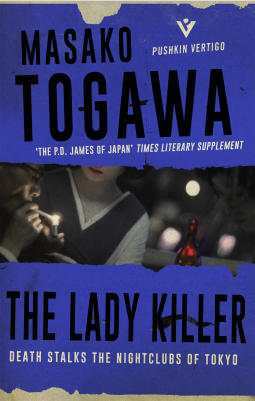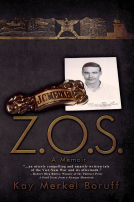
The Lady Killer
by Masako Togawa
This title was previously available on NetGalley and is now archived.
Send NetGalley books directly to your Kindle or Kindle app
1
To read on a Kindle or Kindle app, please add kindle@netgalley.com as an approved email address to receive files in your Amazon account. Click here for step-by-step instructions.
2
Also find your Kindle email address within your Amazon account, and enter it here.
Pub Date Oct 30 2018 | Archive Date Jul 12 2018
Pushkin Press | Pushkin Vertigo
Talking about this book? Use #TheLadyKiller #NetGalley. More hashtag tips!
Description
The Lady Killer leads a double life in Tokyo's shadowy underworld. By day, he is a devoted husband and hard worker; by night, he cruises cabaret bars and nightclubs in search of lonely single women to seduce.
But now the hunter is being hunted, and in his wake lies a trail of gruesome murders. Who is the culprit? The answer lies tangled in a web of clues—and to find it, he must accept that nothing is what it seems.
The Lady Killer pulls from author Masako Togawa’s vibrant personal life as a cabaret performer for Tokyo’s gay nightclub scene during the ‘50s and ‘60s. Throughout her writing career, Togawa continued to champion the LGBT community as a queer woman—sealing her reputation as one of Japan’s most prominent crime fiction authors and LGBT heroines.
Advance Praise
'Full of subtly menacing tensions and sharp psychological insights, told in lean, sparsely ornamented style. This one is a must for the discerning reader.' - Kirkus
'The PD James of Japan.' - Times Literary Supplement
‘There's a great and distinct timbre to this book … it certainly has the cleverness ultimately to keep a genre reader really satisfied.’ — The Bookbag
Available Editions
| EDITION | Other Format |
| ISBN | 9781782273646 |
| PRICE | $13.95 (USD) |
| PAGES | 224 |
Average rating from 17 members
Featured Reviews
 Ranger H, Educator
Ranger H, Educator
Okay it is not a new book (1960s) but a great story told with a dark tinges to all the players. Here is an innocent man of ONE particular crime but his life of 'lies' has him in deep trouble. I like it a lot.
 Reviewer 173301
Reviewer 173301
Superb classic Japanese mystery from an excellent writer. Togawa does a fine job at holding the plot pieces together until the end.
 Ian Y, Reviewer
Ian Y, Reviewer
Hello
I have included The Lady Killer in my list of best new Japan books to read that will appear on:
gaijinpot.com
to be released in the coming week. It will include an amazon link and cover picture.
I will also have a review on my J-lit blog within the next month:
http://ianjoshyateswriting.blogspot.com
My blog gets a few hundred views on average, and gaijinpot.com gets thousands.
 Andrew B, Reviewer
Andrew B, Reviewer
The Lady Killer has been at the very top of my list of books I have wanted to read ever since I read The Master Key. That book was the second novel I gave my Book of the Month award to and remains one of the novels that has stuck with me most since I started Mysteries Ahoy! I found it to be an unsettling read and loved the way Togawa built her characters and themes.
The Lady Killer was the author’s second novel and has previously appeared in English translation. While its subject matter is quite different from that earlier novel, it addresses some similar themes and social issues albeit from a different perspective.
I liked the novel a lot and found its characterization and discussion of themes of social isolation and of male and female sexuality to be thoughtful and considered but I do think it is a slightly less polished work than The Master Key. For instance, there are several attempts to get inside the head of a critical character towards the end of the novel that feel somewhat clumsy and juvenile in tone.
That said there are some really interesting moments and ideas in the story that I found to make for a rewarding read and I was impressed by the author’s ability to find the ambiguity in situations and characterizations. I was happy that the novel met my expectations and I hope that Pushkin Press go on to reissue some of her other works in translation.
{I have abridged my review to remove details of the plot to avoid spoiling the novel for any Netgalley readers}
 Jennifer W, Reviewer
Jennifer W, Reviewer
This is the second Togawa mystery I have read from Pushkin Vertigo, and I sincerely hope it will not be the last. Togawa has been called the P.D. James of Japan, and rightly so. His mysteries have a depth and substance that are lacking from many mid-century mysteries.
The Lady Killer, originally published in 1963 (though I'm not sure if that is the original publication date of the Japanese original or of the first English translation), is presented in three parts. In the first part we follow the movements of the womanizing narcissist Ichiro Honda as he collects sexual conquests, which he then records in his "Huntsman's Diary." As this first part progresses, Honda becomes increasingly convinced that he is being framed for multiple murders, for which he is, in fact, arrested at the conclusion to Part 1. Part 2 follows the movements of his appeal lawyers as they try to uncover what actually happened. And Part 3 provides the truth, the whole story, an unexpected twist that the reader feels they should have seen coming but didn't (at least this reader did not!).
A beautifully written novel of the 1960s, and a near-perfect mystery, The Lady Killer will not disappoint.
 gaby l, Reviewer
gaby l, Reviewer
Masako Togawa is known as the PD James of Japan. Her novel The Lady Killer could have just as easily been written today with the isolation, uncertainty, and its dark twists. It opens with the one night stand of a 19-year old woman and a wealthy musician that she meets in a bar. After the young woman falls from a building 6 months later, we learn about her life and the family that she leaves behind.
As we read about the man that she met and his proclivities - he keeps a journal of his sexual escapades - we also find that he is being followed by bad luck. The women that he meets begin to die and he is taken into police custody, but it takes some time before we learn who has been killing and why.
Masako Togawa delivers an engrossing detective mystery set in Tokyo.
 Marcie B, Educator
Marcie B, Educator
Thanks to NetGalley and Steerforth Press for this edition of The Lady Killer. The novel was originally published in 1963 but could have been written in 2018. It is told from the viewpoint of several people; the charismatic Ichiro Honda, the lawyer who takes Honda's murder case, and a woman who was involved with Honda. Togawa's Japan of the 1960's is dark and atmospheric, with intrigue and dissolution around every corner. The ending is worthy of Agatha Christie.
 Sara P, Reviewer
Sara P, Reviewer
Noir giapponese d'antan (è scritto negli anni '60: non esisteva in test del DNA!), costruito in maniera peculiare, porta a esplorare un mondo che non c'è più e i recessi dello spirito di personaggi che hanno molto da raccontare. Eccezionale la figura dell'avvocato difensore, brillante e anziano, che dalla sua poltrona tutto vede e tutto dirige.
 Rowena H, Reviewer
Rowena H, Reviewer
An artful, old fashioned murder mystery which merrily leads its investigators (and the reader) along a convoluted pathway scattered with clues. Even the title is a masterful play on words, open to several interpretations… more than one of which may be correct. The Lady Killer isn’t as outright bizarre as more modern Japanese crime fiction, but is still imbued with cultural idiosyncrasies and social conventions which make it a distinctly different reading experience to the average mainstream thriller.
The story is told almost exclusively from a male perspective, initially from that of the womaniser who escapes his unhappy marriage by hunting female ‘prey’ in the big city. When his lovers are found strangled, the rest of the investigation is unveiled by his lawyer’s assistant who’s been tasked with proving the client’s innocence. That might be tricky because the evidence against him is compelling…
Although it was written over half a century ago, back in 1963, this slender novel rings some seriously contemporary bells. The predatory adulterer who stalks, seduces and discards vulnerable women makes for an uncomfortable protagonist – but does being a despicable sexual slimeball automatically condemn him as a cold-blooded murderer? The Lady Killer was most definitely ahead of its time in terms of forensic police investigation, and incorporates early insights into the identification of a suspect from blood and other samples, long before DNA typing became commonplace.
The author (a woman) elegantly depicts complex characters in entangled situations, describing just enough detail to bring Tokyo’s seedy side to life without burying the reader in everyday trivia. Presented in fairly plain language, this story is deceptively straightforward – until the moment that it obviously isn’t and you realise just how cleverly you’ve been misled.
8/10
First published in Japan in 1963; published in translation by Pushkin Vertigo on October 30, 2018
Pregnant from a one-night stand, Keiko Obana hangs from a windowsill until she plunges to her death. The police rule the death a suicide, but the inspector who investigates the case believes Keiko killed herself because of the pregnancy. So does a woman who believes her death is attributable to the rogue who made her pregnant.
After that prelude, the story follows Ichiro Honda (the rogue) as he seduces one woman after another, always assuming an identity other than his own, generally pretending to be foreign visitor to Japan. Honda keeps a diary of his sexual conquests that he refers to as his “Huntsman's Log.” The reader also follows Honda’s surprised response when he discovers that some of the women he seduced have been murdered. He even finds one of them dead when he turns up for a new assignation. Of course, the reader knows it is only a matter of time before Honda is blamed for the deaths.
The novel’s second half shifts the focus away from Honda to a young lawyer named Shinji who is helping an older lawyer handle Honda’s case. The older lawyer is the novel’s Sherlock, while Shinji does all the investigative legwork. Shinji is startled to learn that one of Honda’s conquests was a woman he was dating in college. Masako Togawa uses that coincidence to develop Shinji as a dispirited and lonely young man who is also a bit judgmental about Honda’s promiscuity — unless he is simply envious.
The Lady Killer creates a mystery for Shinji to unravel (how and by whom was Honda framed?) but it maintains interest by giving Shinji a series of interviews with characters who are carefully developed despite their brief appearances. Those characters — a medical intern, a salaryman, a salesman, a day laborer, and a gay prostitute — open a window on different aspects of Japanese life. The investigation also reveals how people are like “toothed cogs; once one cog slips out of sync, it damages not merely those around it but also others having no direct connection with it.”
The novel is noteworthy for its glimpse of Japanese culture, including the divide between older people who hold traditional values (for example, values that compel suicide for disloyalty) and younger people who have adopted a western approach to moral decision-making. Themes of duty and loyalty are prevalent throughout the novel. The Lady Killer also explores social norms, not unique to 1960s Japanese culture, regarding the judgment that society visits upon men who use women, even if the women happily agree to be used for a night of passion, and upon women who are branded as promiscuous because they enjoy casual sex.
At the same time, Honda’s view of himself as a hunter and of women as his prey makes it difficult to feel sympathy for Honda, even though he is an innocent accused. Yet Honda is far from being the most aberrant character in a story that exposes the dark side of humanity. This example of Japanese noir strives to spotlight darkness rather than to promote empathy for its characters.
The plot depends on an elaborate scheme to frame Honda for multiple murders that will expose him to the death penalty. My initial reaction was that the killer could more easily have killed Honda; the decision to kill several innocent people struck me as an unlikely way to seek revenge. By the end of the novel, however, a plot twist allows the reader to see the story in a different way. Combined with an epilog that fills in the gaps, the mystery’s resolution is credible, surprising, and satisfying.
RECOMMENDED
 Ari A, Reviewer
Ari A, Reviewer
An artful, old fashioned Japanese Mystery noir that kept me on the edge of my seat. Honestly, I was nervous when I requested this title. I was craving a mystery story and wanted something new (I usually read thrillers or fantasies), but I love that this book kept my attention. I had no clue WHO to trust in the book, and loved every page.
 Cassandra H, Educator
Cassandra H, Educator
This was a re-release of the 1963 book by Masako Togawa. Ichiro Honda is a computer tech who has a wife and lives with her father. A happy family, huh? Not so fast, on weekends Ichiro Honda is home, but during the week he stays in the city, Tokyo for work. In Tokyo he has a secret life. Another apartment, many fake identities, and many women. Now these women are starting to show up dead and Ichiro Honda is the prime suspect. The title Lady Killer is a play on words, not only are ladies being killed, but Ichiro Honda is a very good looking guy ie a lady killer. While this was written originally in 1963, it was very relevant for today's world. Of course the atmosphere descriptions gave the time-frame away. I really enjoyed this "retro" look into Japan and the mystery was quite good also. I am giving this a 3/5 star review rounded to 4. Thank you to NG, the publisher, and the author for allowing me to read this book in exchange for a review.
 Desiree R, Reviewer
Desiree R, Reviewer
Turns out this book was originally published in 1963. Diving into it, I wasn't aware of that fact and so I was a bit put off at first. Nevertheless, I carry on and later found myself so deeply immersed in the story. A married man leading a double life. Working in Tokyo in weekdays, and visits his wife in Osaka during weekends. And while working away from home, he busies himself on a weekly conquests with young women. His life took on a sudden ugly turn when three of his conquests turned up dead and all the evidences are pointed at him. Someone is framing him for the murders and he has no idea who could it be and why. The Lady Killer definitely got an interesting plot and since it is a Japanese novel, the writing style is so much different from what I'm used to reading. The second half of the book slowed down drastically with all the repetitive pattern concerning the investigation process. Despite that though, I still think this is worth a read and so glad to come across this book.


















